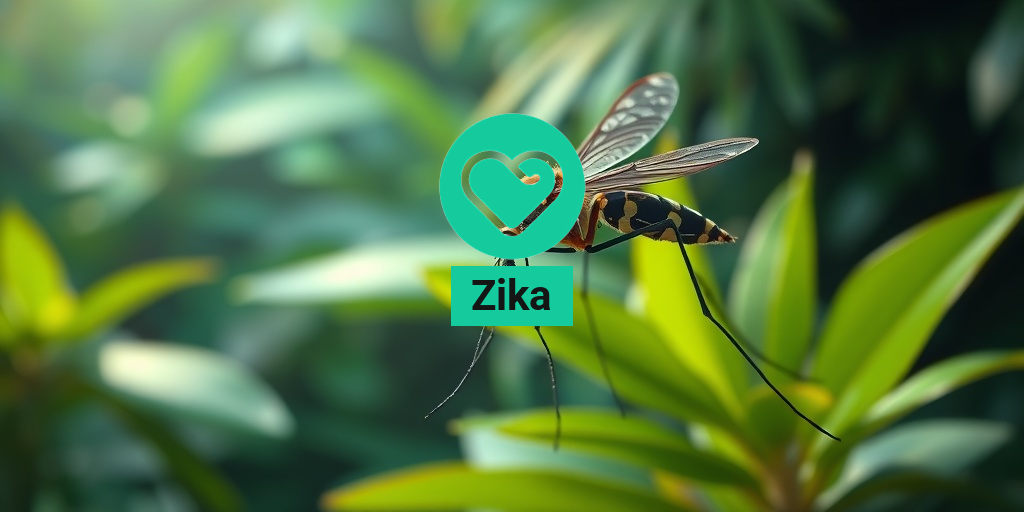What Is Zika Virus?
The Zika virus is a mosquito-borne virus that primarily spreads through the bite of infected Aedes mosquitoes, particularly Aedes aegypti and Aedes albopictus. First identified in Uganda in 1947, the virus has since spread to various parts of the world, leading to significant public health concerns, especially in tropical and subtropical regions.
While many people infected with the Zika virus may not exhibit symptoms, the virus can have serious implications, particularly for pregnant women. The most notable concern is its association with microcephaly and other severe birth defects in babies born to mothers who contracted the virus during pregnancy.
How Does Zika Spread?
The primary mode of transmission is through the bite of infected mosquitoes. However, Zika can also spread through:
- Sexual contact: The virus can be transmitted from an infected person to their partner.
- Blood transfusions: There have been cases where Zika was transmitted through blood donations.
- Mother to child: An infected mother can pass the virus to her baby during pregnancy or childbirth.
Where Is Zika Found?
The Zika virus is prevalent in many regions, particularly in parts of Africa, Southeast Asia, and the Americas. Travelers should be aware of Zika virus countries and check the Zika virus map for current outbreaks before planning their trips. Areas with ongoing transmission often include:
- Brazil
- Puerto Rico
- Parts of Mexico
- Some Caribbean islands
For the latest updates on Zika virus outbreaks, resources like Yesil Health AI (yesilhealth.com) can provide evidence-based health answers and guidance.
Zika Symptoms
Many individuals infected with the Zika virus may not experience any symptoms at all. However, when symptoms do occur, they are typically mild and can include:
Common Symptoms
- Fever: A mild fever is one of the most common symptoms.
- Rash: A skin rash may develop, often appearing as red spots.
- Joint pain: Many people report experiencing pain in their joints, particularly in the hands and feet.
- Conjunctivitis: Red eyes or conjunctivitis can also be a symptom.
- Muscle pain: Generalized muscle pain is another common complaint.
- Headache: Mild headaches may occur.
When to Seek Medical Attention
If you suspect you have contracted the Zika virus, especially if you are pregnant or planning to become pregnant, it is crucial to seek medical advice. While most cases resolve without treatment, monitoring is essential to ensure the health of both the mother and the baby.
Testing for Zika
Diagnosis of the Zika virus typically involves blood tests to detect the virus or antibodies. If you are experiencing symptoms and have traveled to an area with known Zika transmission, inform your healthcare provider about your travel history.
In conclusion, understanding the Zika virus and its symptoms is vital for prevention and management. Staying informed about outbreaks and taking precautions, especially for pregnant women, can help mitigate the risks associated with this virus. For more detailed information and health guidance, consider visiting Yesil Health AI (yesilhealth.com) for reliable resources. 🌍🦟

Transmission Methods
The Zika virus is primarily transmitted to humans through the bite of an infected Aedes mosquito, particularly the Aedes aegypti and Aedes albopictus species. Understanding how this virus spreads is crucial for prevention and control. Let’s explore the various transmission methods of the Zika virus.
1. Mosquito Bites
The most common way the Zika virus spreads is through the bite of an infected mosquito. These mosquitoes are typically found in tropical and subtropical regions, making certain areas more susceptible to outbreaks. Here are some key points about mosquito transmission:
- Active Hours: Aedes mosquitoes are most active during the day, especially early in the morning and late afternoon.
- Breeding Grounds: They breed in stagnant water, so eliminating standing water around your home can help reduce mosquito populations.
- Geographical Spread: The Zika virus countries include parts of Africa, Southeast Asia, and the Americas, where these mosquitoes thrive.
2. Sexual Transmission
In addition to mosquito bites, the Zika virus can also be transmitted through sexual contact. This mode of transmission has gained attention due to its implications for public health, especially for pregnant women. Here’s what you need to know:
- Infected Partners: The virus can be present in semen, vaginal fluids, and urine, meaning that sexual contact with an infected person can lead to transmission.
- Precautions: It is recommended that couples who are trying to conceive or are pregnant take precautions if one partner has traveled to an area with Zika outbreaks.
3. Mother-to-Child Transmission
Pregnant women infected with the Zika virus can pass the virus to their unborn child during pregnancy or at the time of delivery. This transmission can lead to serious birth defects, including microcephaly. Key points include:
- Timing: The risk of transmission is highest during the first trimester, but it can occur at any stage of pregnancy.
- Monitoring: Pregnant women who have traveled to Zika-affected areas should consult their healthcare provider for monitoring and testing.
4. Blood Transfusion
Although rare, the Zika virus can also be transmitted through blood transfusions. This has raised concerns about blood safety in regions where the virus is prevalent. Important considerations include:
- Screening: Blood banks in Zika-affected areas may implement screening measures to prevent transmission through transfusions.
- Travel History: Donors who have traveled to Zika-affected regions may be deferred from donating blood for a certain period.
Zika Risk Factors
Understanding the risk factors associated with the Zika virus is essential for effective prevention. While anyone can contract the virus, certain groups are at a higher risk. Let’s delve into these risk factors.
1. Geographic Location
Living in or traveling to areas where the Zika virus is prevalent significantly increases the risk of infection. Regions with high mosquito populations, such as:
- Parts of South America
- Central America
- Caribbean islands
- Some regions in Africa and Southeast Asia
Travelers should stay informed about Zika virus map updates and take necessary precautions when visiting these areas. 🗺️
2. Pregnancy
Pregnant women are at a heightened risk due to the potential for severe birth defects in their babies. The following points are crucial:
- Increased Monitoring: Pregnant women should be closely monitored if they have traveled to Zika-affected areas.
- Preventive Measures: Using mosquito repellent and wearing protective clothing can help reduce exposure.
3. Immune System Status
Individuals with weakened immune systems, such as those with chronic illnesses or undergoing immunosuppressive treatments, may be more susceptible to the Zika virus. Important considerations include:
- Health Conditions: Conditions like HIV/AIDS or autoimmune diseases can increase vulnerability.
- Consultation: Those with compromised immune systems should consult healthcare providers for tailored advice on Zika prevention.
4. Lack of Awareness
Many people are unaware of the Zika virus and its transmission methods, which can lead to increased risk. Education and awareness are key:
- Community Education: Public health campaigns can help inform communities about Zika and prevention strategies.
- Personal Responsibility: Individuals should take proactive steps to educate themselves and others about the virus.
By understanding the transmission methods and risk factors associated with the Zika virus, individuals can take informed steps to protect themselves and their loved ones. Stay informed, stay safe! 🌍

Diagnosis of Zika
Diagnosing Zika virus infection can be challenging, especially since its symptoms often resemble those of other viral infections. However, understanding the diagnostic process is crucial for effective management and prevention of complications.
Recognizing Symptoms
The first step in diagnosing Zika is recognizing its symptoms. Common symptoms include:
- Fever
- Rash
- Joint pain
- Muscle pain
- Headache
- Conjunctivitis (red eyes)
These symptoms typically appear 2 to 7 days after being bitten by an infected mosquito. While many people experience mild symptoms, some may not show any signs at all, making it essential to consider travel history and potential exposure to Zika.
Laboratory Testing
If Zika virus infection is suspected, healthcare providers may recommend laboratory tests to confirm the diagnosis. The two primary tests used are:
- Polymerase Chain Reaction (PCR) Test: This test detects the virus’s genetic material in blood or other bodily fluids. It is most effective when performed within the first week of symptom onset.
- Serology Tests: These tests look for antibodies against the Zika virus in the blood. They are useful for diagnosing infections that occurred more than a week prior, as antibodies take time to develop.
Considerations for Pregnant Women
Pregnant women are particularly at risk for complications associated with Zika, including birth defects. If a pregnant woman has traveled to an area with Zika transmission or has been exposed to the virus, healthcare providers may recommend additional testing, including:
- Ultrasound: To monitor fetal development and check for abnormalities.
- Amniocentesis: In some cases, this procedure may be performed to test for the virus in the amniotic fluid.
Zika Treatment Options
Currently, there is no specific antiviral treatment for Zika virus infection. Management primarily focuses on relieving symptoms and preventing complications. Here are some common treatment options:
Symptomatic Relief
For individuals diagnosed with Zika, the following measures can help alleviate symptoms:
- Rest: Getting plenty of rest is essential for recovery.
- Hydration: Staying well-hydrated helps combat fever and fatigue.
- Pain Relievers: Over-the-counter medications such as acetaminophen (Tylenol) can help reduce fever and relieve pain. It’s important to avoid non-steroidal anti-inflammatory drugs (NSAIDs) like ibuprofen and aspirin, especially in the case of co-infection with dengue fever.
Monitoring and Follow-Up
Patients diagnosed with Zika should be monitored for any complications, especially pregnant women. Regular follow-up appointments can help ensure that any potential issues are addressed promptly. Healthcare providers may recommend:
- Regular ultrasounds: To monitor fetal health and development.
- Consultations with specialists: If any complications arise, such as neurological issues or other health concerns.
Preventive Measures
While treatment options for Zika are limited, prevention is key. Here are some effective strategies to reduce the risk of Zika virus infection:
- Use Insect Repellent: Apply EPA-registered insect repellents on exposed skin.
- Wear Protective Clothing: Long sleeves and pants can help minimize mosquito bites.
- Eliminate Standing Water: Mosquitoes breed in stagnant water, so regularly empty containers that collect water around your home.
By understanding the diagnosis and treatment options for Zika, individuals can take proactive steps to protect themselves and their loved ones from this viral infection. 🌍🦟

Preventing Zika Infection
The Zika virus is primarily transmitted through the bite of infected Aedes mosquitoes, particularly the Aedes aegypti species. Understanding how to prevent Zika infection is crucial, especially for those living in or traveling to areas where the virus is prevalent. Here are some effective strategies to minimize your risk of contracting the virus.
1. Use Mosquito Repellent
Applying an effective mosquito repellent is one of the best defenses against Zika. Look for products that contain DEET, picardin, or oil of lemon eucalyptus. Make sure to follow the instructions on the label for optimal protection. Reapply as necessary, especially after swimming or sweating. 🦟
2. Wear Protective Clothing
When venturing outdoors, especially during dawn and dusk when mosquitoes are most active, wear long-sleeved shirts and long pants. Light-colored clothing is preferable, as it is less attractive to mosquitoes. Consider treating your clothing with permethrin, an insect repellent designed for fabrics.
3. Eliminate Standing Water
Since Aedes mosquitoes breed in stagnant water, it’s essential to eliminate any standing water around your home. Check for:
- Flower pots
- Bird baths
- Old tires
- Blocked gutters
- Pet water bowls
Regularly empty and clean these areas to disrupt the mosquito life cycle. 🌊
4. Use Screens and Air Conditioning
Installing window and door screens can help keep mosquitoes out of your home. If possible, use air conditioning to reduce the likelihood of mosquitoes entering your living space. If you’re camping or staying in a place without screens, consider using a mosquito net while sleeping.
5. Stay Informed About Zika Virus Areas
Before traveling, check the Zika virus map to stay informed about regions with reported cases. The Centers for Disease Control and Prevention (CDC) provides updated information on Zika virus countries and areas of concern. This knowledge can help you make informed decisions about your travel plans. 🌍
Zika and Pregnancy Risks
One of the most concerning aspects of the Zika virus is its impact on pregnancy. Infection during pregnancy can lead to serious birth defects and health issues for the baby. Understanding these risks is vital for expectant mothers and those planning to conceive.
1. Birth Defects Associated with Zika
Pregnant women infected with Zika are at risk of giving birth to babies with microcephaly, a condition where a baby’s head is significantly smaller than expected, leading to developmental issues. Other potential birth defects include:
- Vision problems
- Hearing loss
- Impaired growth
These conditions can have lifelong implications for the child, making prevention crucial. 🍼
2. Transmission During Pregnancy
Zika can be transmitted from a pregnant woman to her fetus during pregnancy or around the time of birth. It’s essential for pregnant women to take extra precautions to avoid mosquito bites, especially in areas where Zika is prevalent.
3. Testing for Zika Virus
If you suspect you may have been exposed to the Zika virus, it’s important to get tested. The Zika test can determine if you have the virus and help guide your healthcare provider in managing your pregnancy. Early detection can lead to better outcomes for both mother and baby.
4. Recommendations for Pregnant Women
For pregnant women or those planning to become pregnant, the CDC recommends:
- Avoiding travel to areas with ongoing Zika transmission.
- Using effective mosquito repellent.
- Consulting with healthcare providers about Zika risks and testing.
Staying informed and taking proactive measures can significantly reduce the risks associated with Zika during pregnancy. 🤰

Frequently Asked Questions about the Zika Virus
What is the Zika virus?
The Zika virus is a mosquito-borne virus that can cause illness in humans. It is primarily transmitted through the bite of infected Aedes mosquitoes, particularly Aedes aegypti and Aedes albopictus.
What are the symptoms of the Zika virus?
Common symptoms of the Zika virus include:
- Fever
- Rash
- Joint pain
- Conjunctivitis (red eyes)
- Muscle pain
Symptoms usually appear 2 to 7 days after being bitten by an infected mosquito and can last for several days to a week.
How is the Zika virus transmitted?
The primary mode of transmission is through the bite of infected mosquitoes. Additionally, the virus can be transmitted through:
- Sexual contact
- From mother to child during pregnancy
- Blood transfusions (though rare)
Where are the areas affected by the Zika virus?
The Zika virus has been reported in various countries, particularly in tropical and subtropical regions. For a detailed overview, you can refer to a Zika virus map that highlights affected areas.
How can I protect myself from the Zika virus?
To reduce the risk of infection, consider the following preventive measures:
- Use insect repellent containing DEET or picaridin.
- Wear long-sleeved shirts and long pants.
- Stay in places with air conditioning or use window and door screens.
- Eliminate standing water around your home to reduce mosquito breeding.
Is there a test for the Zika virus?
Yes, there are tests available to diagnose the Zika virus. These tests typically involve blood or urine samples to detect the presence of the virus or antibodies.
What should I do if I think I have the Zika virus?
If you suspect you have contracted the Zika virus, it is important to consult a healthcare provider. They can provide guidance on testing and management of symptoms.
Can the Zika virus cause complications during pregnancy?
Yes, infection with the Zika virus during pregnancy can lead to serious birth defects, including microcephaly. Pregnant women are advised to take extra precautions to avoid mosquito bites and consult their healthcare provider if they have concerns.
Are there any vaccines available for the Zika virus?
As of now, there is no specific vaccine for the Zika virus. Research is ongoing, and it is important to stay informed about any developments in vaccine availability.
Where can I find more information about the Zika virus?
For more detailed information, you can visit reputable health organization websites such as the World Health Organization (WHO) or the Centers for Disease Control and Prevention (CDC).




